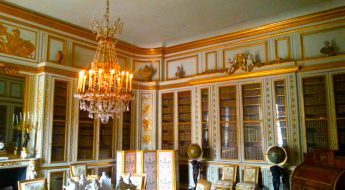Part 4.2 is the second part of Chapter 4.
A Childhood at Versailles consists of the first 5 chapters of the memoirs of Mme de Boigne (1781-1866), née Adèle d’Osmond, who was a French salon hostess and writer. She was born in the Château de Versailles and lived at the court of Louis XVI and Marie-Antoinette until her family fled to England during the Revolution. Later in her long life, she married a rich soldier of fortune 30 years her senior, hosted a brilliant salon in Paris, and became an intimate of the last French queen, Marie-Amélie, consort of King Louis Philippe (r. 1830-1848). Childless herself, Mme de Boigne addressed her memoirs to her grandnephew. The memoirs were not published until 1907, under the title Récits d’une tante, or An Aunt’s Tales. They’ve never been published in English, as far as I know, so I’ve decided to translate the first 5 chapters, the ones that take place mainly at Versailles, and post them here on this blog for interested readers to enjoy for free.
The chapters are quite lengthy, so I’ve broken each one into several parts. In Part 4.2, the author remembers her last meeting with Marie-Antoinette, whose Calvary had begun, in the summer of 1790.
A Childhood at Versailles, Chapter 4, Part 2 (4.2)
After having been entrusted with a commission related to the Dutch refugees in 1788, my father was named minister to the Hague, and he was in that post at the time of our sojourn in England. A quarrel between the Prince of Orange and the French ambassador made the Court of Versailles decide that it would no longer send a minister to Holland. The Republic did not wish to receive anything but an ambassador. This vexation prevented my father from taking up his post; all the more patience was required since he hoped to arrive thereby at the rank of ambassador, which could not be had at the start.
The town of Versailles had reflected on the damage the Court’s absence was causing it. The agitation had calmed, and it regretted the sad days of October. On my mother’s return she could not have been better received by the very people who had railed against her the most at her departure; nonetheless, we did not stay there long. We started by spending the summer at Bellevue, and the following winter we lived in an apartment in the Pavillon de Marsan at the Tuileries.
I perfectly recall a scene from that summer. I had not seen the Queen for several months. She came to Bellevue under the escort of the National Guard, the uniform of which I had been raised to view with horror. The Queen, I believe, was already almost a prisoner, for these people never left her. When she sent for me, I found her on the terrace surrounded by National Guardsmen. My little heart swelled at the sight and I began to sob. The Queen knelt down and pressed her face against mine, veiling both of them with my long blond hair, and entreated me to hide my tears. I felt hers running down. I still hear her “There, there, my Adèle.” She remained for some time in this attitude.
All the onlookers were moved, but it needed the heedlessness of childhood to dare show it in those moments when danger was all around. I do not know if this scene was reported, but the Queen never returned to Bellevue, and it was the last time I saw her other than from afar during my stay at the Tuileries. I have preserved an impression of this moment that is still very vivid. I shall describe her costume. She was in a white linen Pierrot embroidered with coloured sprigs of lilac, a puffy fichu, and a large straw hat of which the wide lilac ribbons were attached by a big knot at the place where the fichu was crossed.
Poor princess, poor woman, poor mother, what a horrid fate was reserved for her! She thought herself quite unhappy then, but that was only the beginning of her trials. Her son, the second Dauphin,21 had accompanied her to Bellevue, and he played with my brother in the sand. The National Guards involved themselves in these games, and the two children were too young to be discomfited by it. I would not for all the world have gone near them. I stayed near the Queen, who held me by the hand. I have been told since that she had felt obliged to explain to her suite that the first Dauphin had liked me a great deal, that she had not seen me since his death, and that that was the reason for our mutual upset.
Notes:
21. Louis XVII, born in 1785, died martyred in the Temple in 1795.

















Leave a Comment